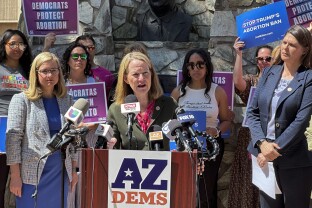Arizona’s abortion ban is testing how much authority a state attorney general has to look the other way rather than enforcing a law they disagree with.
State Attorney General Kris Mayes, a Republican turned Democrat, has said she will not enforce Arizona’s near-total abortion ban should it go into effect after the state Supreme Court upheld it earlier this month. Her stance isn’t new: Throughout her campaign for the office, Mayes said she would not prosecute anyone for getting an abortion.
Mayes is well within her prosecutorial discretion to not take any action in abortion cases. A 2023 executive order from Democratic Gov. Katie Hobbs gave the attorney general sole prosecutorial authority over abortion-related cases. Previously, county attorneys, who are also elected officials, would generally be the ones to prosecute these cases.
The state Legislature could repeal the abortion law as soon as this week: The House passed a repeal bill last week, and the Senate could vote on it as early as Wednesday. But time is tight — the ban is set to take effect on June 8, and state laws can only take effect 90 days after the last legislative session, unless they are passed with an emergency declaration requiring a two-thirds majority in both legislative chambers.
Both Democrats and Republicans agree that Mayes has prosecutorial discretion over abortion.
Rick Romley, a former Republican Maricopa County attorney, said several old laws are still in place that no one prosecutes.
“I can’t remember ever a time that adultery was ever prosecuted in this state, although it’s still technically on the books. It’s a prosecutorial discretion that you have,” he told NOTUS.
However, Mayes’ action, according to former Democratic Attorney General Terry Goddard, shows how the attorney general’s office has been politicized.
“I think what Kris Mayes is doing is within the realm of prosecutorial discretion; it’s perhaps on the extreme end by just saying, ‘I’m not going to do anything in this category.’ But what we find, and there’s no doubt about this, more and more on the right and the left in the country, is that attorneys general are basically saying, ‘I’m going to enforce the laws that I agree with,’” Goddard said.
“It started on the right, but now it’s moved on to others, and frankly, as somebody who used to hold that office, I have some trouble with that,” he added.
Goddard said Mayes is “taking a page out of the book” of attorneys general like Republican Ken Paxton in Texas, who has used the commerce clause to go after abortion providers and hospitals who may violate Texas’ own abortion law.
Jim Walsh, a former assistant attorney general under Goddard, said Mayes has a good case for not defending the law because of the state’s constitutional right to privacy. Mayes has cited Article 2, Section 8 as grounds for not prosecuting abortion-related cases.
“If you find a statute unconstitutional … you can’t enforce it. You’re not obliged to act unethically and illegally,” Walsh told NOTUS.
Even while there’s broad agreement Mayes has prosecutorial discretion, there’s substantial disagreement on whether the executive order leaving abortion cases to her office is constitutional. While the governor has the authority to take any individual case away from a county attorney, Hobbs’ action is unprecedented.
“You can take an individual case, that is clear by statute, but to take every case prospectively and give it to the attorney general, I think it’s a real question, and the courts are going to have to decide that,” Romley said.
Goddard said that stripping this kind of authority away from the county attorneys is not completely possible.
“Without legislation, I don’t see how you can cut the county attorneys out of the picture,” he told NOTUS. “At the very best, what the governor has done has given the AG some kind of shared responsibility for items involving the statute on abortion.”
Mayes’ discretion is also not enough security for Arizona’s abortion providers, who are still afraid of being penalized after Mayes leaves office.
“I think having a supportive governor and attorney general is really important and much better than we were in 2022, but [Mayes] even said the statute of limitations can be seven years. She might not be attorney general during that time, so she can’t guarantee that a hostile AG in the future wouldn’t go after me or another doctor if we did abortions,” Dr. Gabrielle Goodrick, medical director of Camelback Family Planning in Phoenix, told NOTUS. “If the ban kicks in, we’re not going to provide abortions.”
Mayes assumed office in 2023 after winning by 280 votes, one of the closest statewide races in Arizona history.
—
Tara Kavaler is a NOTUS reporter and an Allbritton Journalism Institute fellow.
Sign in
Log into your free account with your email. Don’t have one?
Check your email for a one-time code.
We sent a 4-digit code to . Enter the pin to confirm your account.
New code will be available in 1:00
Let’s try this again.
We encountered an error with the passcode sent to . Please reenter your email.


